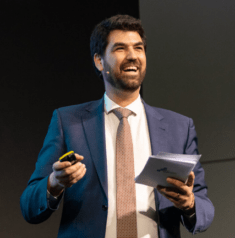

Maxime Lagane established his company in 2021 to confront a unique issue: through retirement, 500,000 people will leave the workforce in the next four to five years.
According to Maxime, “Attractivity and transmission to next generations are a real challenge for all companies—private, public. Everyone is affected by that. It's a structural change.”
“To attract the next generation, you need to promote your company, be visible, and adopt the codes of the new generations. And as you probably know, they have different codes of communication.”
Maxime believes videos could be the right medium to bridge generations, using a company’s employees as ambassadors.
“We create content. This is our specialization. We produce more than 200 videos a year for big brands, and we involve talents from all generations in making those videos,” he says.
“Pillar number one is external communication - helping companies promote their services, promote their brand through their ambassadors, using video, and also helping them navigate LinkedIn. We train them to publish their videos, design the content, produce it, and then help them promote it."
“You need to care for the inside to make it shine on the outside.”
“And this is quite the mission of the company—empowering our generations. Strong communication skills within a company are essential. We develop talents as well.
Pillar number two is internal communication We train people—managers, the next generation—to be better communicators, creating a better experience with their internal or external clients.” Nonetheless, Maxime notes, “Nonclient-facing teams, such as IT and legal functions, face communication issues within the firm as well.”
“There isn’t just one challenge; I think there are multiple challenges. One of them is the leadership style. The old-fashioned, military-style, command-and-control, authority-driven approach—You do what I ask without any explanation or sympathy—is not working well with the next generation.”
Maxime believes in helping managers become better communicators and developing soft skills, which are not always taught in school. “This is where I think all generations face a challenge.”
Maxime feels explaining the “why” of the task, the vision, the mission, may help communication across generations: “People are looking for a sense of purpose and a vision in life. This isn’t true only for Gen Z; I think anyone after COVID has accelerated that trend.”
“For me, CEO should mean Chief Explanatory Officer.”
“I think Gen Z has a particular talent for identifying whether you’re telling them corporate nonsense or not. They can smell it. If you aren’t aligned in what you say and do, there’s a risk of people being disappointed.
“Nothing is worse than starting a campaign with beautiful words, values, and promises, only for people to meet you and be completely disillusioned.
“I always say, start with the inside, and then see what is truly concrete and factual that you can promote on the outside.
“And again, what makes your company great is often the people. So listen to your people—what do they think about your brand? What are they proud of? What successes have you achieved together?”
“Success stories speak for themselves. There is no bullshit in success stories.”
Maxime agrees that the mission is not only to attract but also to retain talent. “If you put a lot of effort into recruitment and, six months later, people say it wasn’t a good fit, then you have a problem—a real problem. It means that either your onboarding wasn’t right, the profiling during recruitment wasn’t accurate, or potential management issues, or the culture wasn’t maybe a good fit.”
He believes, however, that before you do any attraction and retention, the culture needs to be built from the inside out, and that’s where you have to start.
“I don’t think it’s a question of age; I think it’s a question of mindset and attitude. I’ve met next-gen people who think like those who are much older. At the same time, I’ve met young talents who have accomplished incredible things at a young age—courageous, ambitious, driven, kind, and intelligent people.”
Maxime says that while some people take more time to adapt than others, he thinks everyone is capable of adaptation. “It’s what I call a muscle. It’s a matter of curiosity and continuous learning,” he says.
“We call them 'coachable' people. They want to do better, are very curious, and make the time and effort to take the next step. So it’s not a question of age.”
“I think the world we’re living in is moving at a rapid pace."
Maxime shares an apocryphal story about Einstein. A student, who failed the same exam twice, approached him saying he didn’t understand why, as the questions were the same every year. Einstein tells the student, “Yes, but the answers are different. Why? Because the variables are different, the context is different. So, every time you think everything is a formula that works, remember the past is not a guarantee of the future. It’s no longer true.”
As an example, Maxime adds, “A young person who is 25 years old with no family and no kids doesn’t have the same flexibility and needs as the same young person who has a family. It’s the same next-gen, but the context is different.”
Maxime says it’s important to listen to the specific needs of your audience to better understand that context, instead of assuming trends based on age and generations.
With mentoring, “You try to help them reach the next step, but they do it themselves.” Furthermore, Maxime explains that mentoring is a mix of three approaches.
One is coaching. “Not giving the answer but helping by asking open-ended questions so the person comes up with their own answers. This is super powerful with the next gen. Instead of giving the solution, ask them what they think is best. It forces them to really prepare and consider their options.”
Maxime believes it works well with the next generation because they like to be involved and empowered. “I think everyone likes that, so it’s not just for the next gen.”
“You pull more than you push. Ask more than you give.”
The second approach is training. He explains that training is implemented when some mentees need answers because they feel lost. “When you start something new, you need a little help. As a mentor, you can use training because some mentees need that guidance. So you shift from coaching to training.”
Maxime says the third approach is when you stop training and start advising. You lay out a couple of options and ask the mentee what they think is best. If the mentee is still lost, you begin advising. However, Maxime warns that this is more difficult because you can easily miss the context.
Maxime believes you should adapt your style depending on these three approaches and clarify which one you’re using with the mentee so they feel comfortable. It works because people want to feel involved, empowered, and receive one-on-one attention.
“I think this next generation is very inspiring. Although they sometimes seem confident, they need support. They have difficulties expressing their problems sometimes. We need to be aware of this because they are a generation that was deeply affected by COVID. It was very difficult; we broke them during their best years. It wasn’t easy for anyone, but especially for young talents, I think. The links between generations have been a little broken as well.”
Maxime believes the connection between generations needs to be mended. “Many young talents and companies tell us they have difficulties having face-to-face conversations. They prefer Zoom or written emails instead of live conversations, which I think is dangerous for both sides,” he says.
He says we need to help the young generation. “They need consideration. They need rewards for what they’re doing.”
Well, that’s Maxime on the next generation. If you want to learn more about Maxime and 123 Next Gen, visit 123nextgeneration.com.
We sincerely thank Maxime Lagane for sharing valuable insights on this important and fascinating topic. We appreciate the time and thoughtfulness you brought to the conversation.
By the same author: GenZ: The Why & The How
Image: Maxime Lagane
I am passionate about human capital development and I strive to be the link between HR and employees. My role involves creating a positive work environment through engagement initiatives, fostering a sense of belonging, and attracting young talent through employer branding. What motivates me is seeing the measurable impact I have in creating a work atmosphere where people want to stay and thrive.